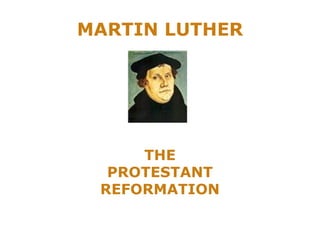
Martin luther
- 2. Who was Martin Luther? • Born in Germany in 1483. • After surviving a violent storm, he vowed to become a monk. • Lived in the city of Wittenberg. • Died in 1546.
- 3. Definitions Protest To express strong objection Reform To improve by correcting errors
- 4. Problems in the Church • Corruption • Political Conflicts
- 5. Corruption • The Church raised money through practices like simony and selling indulgences. In 1517 John Tetzel rode through Germany selling indulgences.
- 6. Advantages of Buying Indulgences Go Directly to Heaven! • Do not go to Hell! • Do not go to Purgatory! • Get through Purgatory faster! • Do not pass Go!
- 8. Papal Schism • In 1301 the king tried to tax the French clergy. • The pope threatened to excommunicate the king and so was arrested. He was later released. • The next pope, Clement V, moved the headquarters of the Church from Rome to Avignon in southern France. • Many people felt that the French kings controlled the Church. Rome Avignon
- 9. Three Popes! • The next six popes lived in Avignon. Pope Gregory then moved the papacy back to Rome in 1377. • When Gregory died, the French cardinals did not like the new pope in Rome, so they elected a different pope in Avignon. • Later, a Church council elected a third pope.
- 10. Calls for Reform • John Wycliffe (1330-1384) – Questioned the authority of the pope • Jan Hus (1370-1415) – Criticized the vast wealth of the Church • Desiderius Erasmus (1469- 1536) – Attacked corruption in the Church
- 11. Luther Looks for Reforms • Luther criticized Church practices, like selling indulgences. • He wanted to begin a discussion within the Church about the true path to salvation. • He nailed his Ninety- Five Theses, or arguments, to the door of Wittenberg cathedral for all to see.
- 12. Protestant Teaching: Justification by Faith Alone • The Bible is the only source of truth. • People can read and understand the Bible themselves. • Salvation comes only through faith in Christ. A fifteenth-century hand-written Bible, in Latin Photo by Arpingstone, Wikipedia Commons http://en.wikipedia.org/wiki/Bible
- 13. Excommunication • Pope Leo X demanded that Luther recant 41 of his Ninety-Five Theses. • Luther was brought before the Diet of Worms. • In January 1521, Luther was excommunicated from the Church.
- 14. The Printing Press • Luther’s ideas spread quickly with the help of the printing press. • Luther’s supporters distributed copies of his speeches and essays far and wide. • Millions of people sided with Luther against the Roman Catholic Church.
- 15. A New Church • Luther soon had many followers. • His supporters began to organize a new Christian denomination. • Several German princes supported Luther. • Lutherans and Catholics fought each other. • The first wars ended with the Treaty of Augsburg, but fighting in Europe over religion continued to the mid- seventeenth century. Luther set fire to the pope’s order expelling him from the Church.
- 16. Lutheranism • Luther’s followers disagreed with many of the teachings of the Catholic Church. • They rejected the authority of Church councils and the pope. • Reading the Bible was the only way to learn how to lead a good life. Luther translated the Bible into German.
- 17. The Reformation spreads to other countries. • France: John Calvin preached the idea of “predestination” and that some people had been chosen by God for salvation. • England: King Henry VIII refused to recognize the Roman Catholic Church and started a new church, the Church of England.